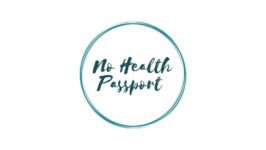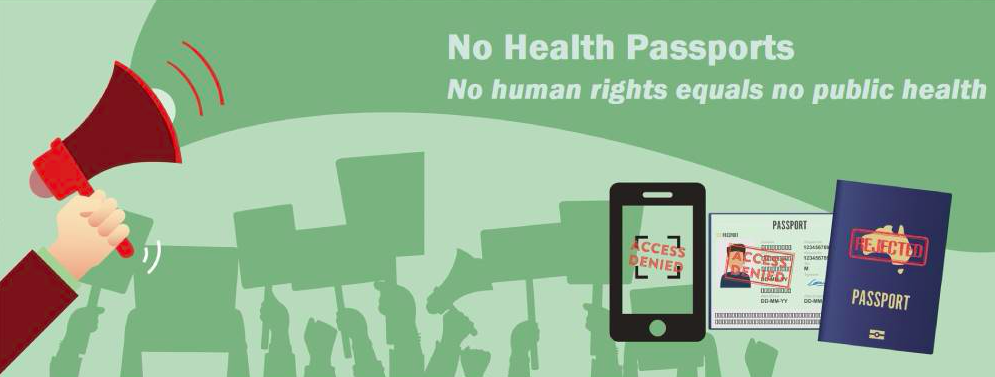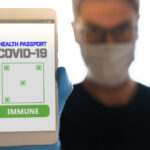Rallying Against COVID Passports: An Interview With No Health Passport’s Ben Lay

The European Parliament voted last week to call on the EU to support the “Indian and South African World Trade Organization (WHO) initiative for a temporary waiver on intellectual property (IP) rights for COVID-19 vaccine”, so that nations of the Global South can produce cheap vaccines for local use.
It’s somewhat hard to believe that as the official global COVID death toll approaches 3.5 million people – and nations grapple to immunise entire populations – that governments of the Global North are debating on whether to allow poorer nations to have an adequate vaccine supply.
As his government was debating re-entering lockdown, Malaysian PM Muhyiddin Yassin stepped forward to welcome the Biden administration’s support of suspending IP rights for COVID, but he went further in calling for the IP rights system to be dismantled as more pandemics are likely.
WHO Health Emergencies Program director Dr Mike Ryan said in April that due to the disparity in the availability of the vaccine, the imposition of vaccination certification – or health passports – could lead to further global inequity for the citizens of nations that can’t afford to access the jab.
Domestic implementation
A 19 April WHO statement outlined that the organisation recommends against the requirement of health passports being a condition of entry into countries, as it would “deepen inequities and promote differential freedom of movement”.
And there are those who are campaigning against the implementation of health passports or vaccine certification domestically.
In mid-April, an online petition against the roll out of Australian health passports was presented to federal parliament.
However, PM Scott Morrison said on 20 May that his idea for a digital health passport that would permit quarantine-free travel across state borders is still on the agenda , despite the premiers of NSW and Queensland having spoken out about their concerns over such a proposal.
“I know the NSW premier would prefer that there were no restrictions, but she can make decisions in relation to” her state, the prime minister said. “It’s a practical proposal, and I look forward to discussing it further with the premiers and chief ministers.”
A human rights issue
No Health Passports is raising awareness around the issues posed by the implementation of any type of vaccine certification which would be required to gain entry into regions or to access certain venues and places. The not-for-profit organisation outlines that it is neither antivax or provax.
Currently running a series of rolling protests, No Health Passports outlines on its website that as it is seeking to engage broad public support against a certification program, it seeks to avoid “antivax, anti-government, extreme and conspiratorial nonfactual information” at its events.
Sydney Criminal Lawyers spoke to No Health Passports spokesperson Ben Lay about the broader implications health passports pose, the rights infringements such an initiative could result in, and what can be expected at its rallies.

Firstly, your group is campaigning against the establishment of any form of health passport in Australia in relation to the COVID-19 pandemic and the virus vaccination.
Ben, what is a health passport? And why do you think their implementation would be problematic?
A health passport is a digital or paper-based certification of vaccination and or infection status, also known as vaccine passports or digital immunisation certificates. It may be shown on a smart phone application, paper-based or as a QR code.
Health passports could be used to limit who can cross at domestic or international borders, as well as a condition to enter workplaces, businesses or a range of venues.
Their implementation may be problematic for a number of reasons not limited to the following:
Ethics and equity. Due to inequitable supply of vaccines and varying efficacy between the different types of vaccines, vaccine passports may lead to a segregated society favouring the vaccinated.
This is particularly concerning in developing countries where supply is limited. And health passports also pose concerns around human rights violations.
There is insubstantial evidence to support implementation and the usefulness of vaccine passports.
The implementing of vaccine passports currently contradicts advice from the World Health Organisation. And it may in fact increase hesitancy.
Health passports, as an ID that you may effectively be required to carry, are something associated with totalitarian governments. And they have no place in Australia.
Looking at the issue of health passports through a human rights lens, how do you see their implementation impacting upon people’s basic rights?
Vaccine passports will adversely affect those who choose not to vaccinate, those who cannot be vaccinated due to health or religious reasons, and those who do not have access to vaccines.
They would infringe upon freedom of movement and freedom to work – if implemented by employers. There are issues around the right to informed consent and bodily autonomy, the right to privacy and freedom from discrimination.
These will all be major concerns for those who choose not to vaccinate.
Human rights are about respect and dignity for all humans. Implementation of vaccine passports is effectively medical coercion and could lead to civil unrest in an already polarised environment.
Are health passports being implemented elsewhere in the world at present? Or have there been any precursors to such a program rolled out?
Green passes were recently implemented in Israel. However, they will be revoked from the start of June as the country is down to only 12 new virus cases on Saturday. That’s down from a daily peak of more than 10,000 in January.
China has implemented an app that certifies vaccination status by scanning a QR code. Japan is in the planning stages for a digital vaccine passport.
The European Union endorses the idea of a “Digital Green Certificate”, which includes vaccine and infection status, as well as recovery status for travel.
The United States is in the development process of digital vaccine certificates for smartphone apps. Thailand, Denmark, Sweden and Estonia are also planning to implement vaccine passports.
Prime minister Scott Morrison and health minister Greg Hunt have discussed the potential implementation of domestic vaccine passports in Australia. Jane Halton has also endorsed the notion.
The COVID-19 vaccination policy document on the Department of Health website states that digital immunisation status certificates may be implemented for childcare, work, school and travel in Australia, via the Australian immunisation register.
Qantas has also implemented a trial run of a digital vaccine passport ahead of international borders reopening.
Your website stresses that the campaign is focused on health passports themselves, therefore, any antivaxxer rhetoric or conspiratorial information being used in relation to it or at events would be problematic.
Can you elaborate a bit more on why this is the case?
The answer is multifaceted in terms of public perception and the Medical Freedom movement to date.
The term “antivaxxer” has become somewhat of a stigmatised label. That’s in part due to the information warfare and disinformation that has featured over the last 18 months during the pandemic.
The existing Freedom movement hasn’t gained a lot of support from the general population in Australia. We believe this is primarily due to the distorted and somewhat controversial messaging seen at protests and on the mainstream media.
The problems arise on various levels, for example a recent news article mentioned the establishment of an Australian police surveillance operation called Taskforce Lotus, with the purpose of monitoring online activity of antivaxxers in case of a domestic terror attack on the vaccine storage facility.
Additionally, many people have become hesitant that wouldn’t ordinarily hesitate and do not identify as antivaxxers.
In general, antivaxxers have been portrayed as “right-wing nutjobs” and “selfish” in recent times.
It’s a nuanced issue and the net result of the resistance to date, in our opinion, has in effect silenced the majority who have been effectively alienated by the Freedom movement due to the mixed, extreme and conspiratorial nature of the messages that have been promoted.
Furthermore, we have witnessed an infiltration of extremists of sorts into the Freedom movement as demonstrated at last week’s Global Freedom rally in Melbourne, with the presence of the Australian Peacemakers: a far-right group, who stated the purpose of their presence was to protect protesters from the police with the use of force if necessary.
Some of these rallies are even organised by a person who is affiliated with the Proud Boys. These are major red flags that indicate a high degree of infiltration by agent provocateurs and controlled opposition.
As members of the community, it’s alarming to see the trajectory of that movement and we prefer to distance ourselves from being associated or affiliated with it in any way.
Antivaxxers are perceived as a threat to public health particularly in a pandemic, which could be considered a national security risk.
The issue of coercion via vaccine passports has a clear message for mainstream appeal and inclusiveness under the banner of human rights.
It is not antivax to be against mandatory or coerced vaccines, particularly considering the World Health Organisation and the Australian Medical Association share those views and agree that mandatory vaccination policy is indeed counterproductive for uptake.
And lastly, Ben, you’re staging a series of rolling rallies against health passports. What will these involve?
The rolling monthly rallies will involve acknowledgement of country, first and foremost.
We acknowledge that sovereignty has never been ceded and that Australia always was and always will be Aboriginal land. We pay our respects to elders past, present and emerging.
The speeches at the rallies are about raising awareness of the various ethical and human rights issues associated with digital immunisation certificates and all rallies will include a march.
As a not-for-profit organisation, No Health Passports is actually a registered COVID Safe business with a COVID safety plan for all events. All events are police approved and family friendly.







